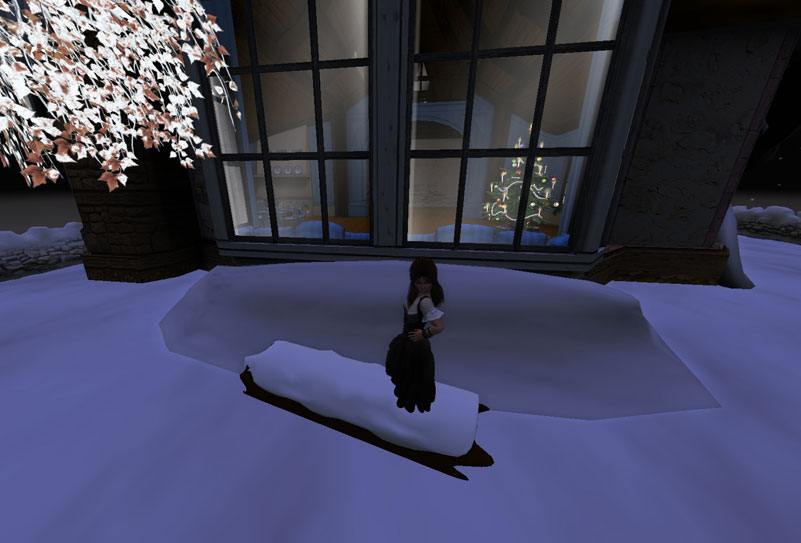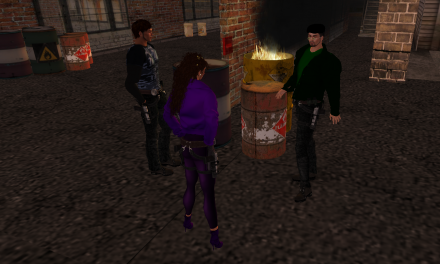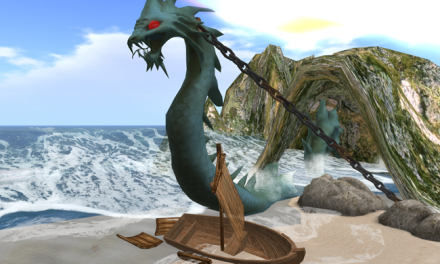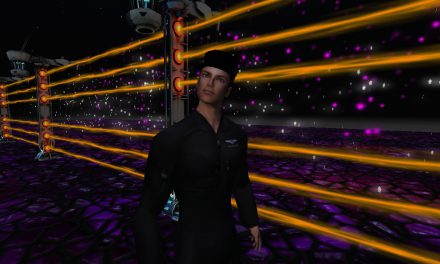 Family Myths
Family Myths
by
Edward M. Turner
The young girl tapped at the windowpane.
The black cat in its basket raised its head, looked toward her, recognized her. It got out of the basket, lightly jumped up to the sill and arched its back against the pane.
The girl tapped the pane again and giggled when the cat, its black liquid eyes shining, batted a forepaw at her fingers. They played like this for several minutes. Then she put her red lips to the glass and the cat rubbed its head to the pane, accepting the kiss.
The north wind gusted and came off the snow banks, filling the air with snow powder and rained it against the windowpanes. Inside, the cat flinched when the wind howled. Flames in the fireplace flattened then expanded as a draft found its way down the chimney.
The girl’s long auburn hair fluttered about her face. She glanced at the crescent moon. Dark fleecy clouds scudded across its face.
The cat turned, ears alert. It hopped off the sill and disappeared behind a divan. The fire burned low in the fireplace, its crackling logs soundless to the little girl standing outside.
The door to the sitting room opened and a man paused on the threshold, his silhouette tall and wide. He stood in shadow, held his head to one side, listened, seemed to sniff. Smoke from a large meerschaum pipe held in one hand swirled lazily about his features and drifted toward the ceiling.
He entered the room, shuffled with the aid of a heavy cane past the decorated Christmas tree with its unlit candles tied to the higher branches. He stopped by the fireplace.
The young girl saw a heavy-set elderly man dressed in a fine golden brocaded smoking jacket secured with a red sash. A round brimless cap with a purple tassel sat squarely on his blockhead. A fringe of gray hair gave him a distinguished air. He wore leather slippers lined with yellow fleece. It was the grandfather.
He turned to the window.
The little girl instantly dropped in a crouch. She could feel his gaze, sense his approach. The girl chanced a peek and caught a glimpse of a craggy face at the window. Piercing gray eyes moved back and forth, searched the landscape.
She darted to the side and ran lightly past the front of the house to the fields beyond and flitted across the crust leaving no prints. Her skirt flapped in the wind. She raced her shadow over snow dunes, across dips, leaping an occasional stonewall.
Reaching the end of the fields the little girl entered a thicket, trotted down a slope covered in evergreen bushes to a gully, and her home built into the side of a hill.
She slipped through the door and smiled. Her mother turned to her.
“Back already, Teresa?”
“Yes.”
Her mother gave Teresa a quick examination.
“You found nothing?”
The girl climbed onto a wooden highchair at the table, swung her legs.
“I don’t like chickens.”
Her mother sighed, “Did you even check?”
“I peeked in the window of the big house. They have candles on a tree.”
Her mother frowned.
“Then the old gruff fellow came, and tried to see me.”
Mother turned away, reached in an upper shelf and brought down a fire-blackened caldron. She kept her back to her daughter. “He didn’t see you, did he?”
“No. I ran away. He doesn’t like our kind does he?”
Mother carefully stirred the liquid in the kettle with a worn wooden ladle, its handle broken off short. “You shouldn’t go there.”
“Mommy, can’t we have a tree? And decorations?”
“You know that isn’t for us.” She put the caldron on the table along with a saucer and a small wooden spoon.
“Tomato soup!”
“Yes, if you say so. Tomato soup.” Mother smiled. The dark liquid had the consistency of gruel from the cold.
Ladling out Teresa’s portion, a spot of liquid spilled on Mother’s hand. She snaked a tongue along her palm to gather the drop. She looked at her daughter and received a mischievous grin.
“Mustn’t waste this, must we?”
Teresa giggled.
As the little girl ate, Mother made up a bed for her in an old apple crate. She’d glance at Teresa with a tender smile that had a somewhat brittle quality about it. Then Mother put the heavy caldron back on the shelf, but not before she scooped with a chipped saucer and drank a small amount herself. Mother closed her eyes when she swallowed, then licked her lips of the excess moisture.
“Mommy?” Teresa had changed into a nightgown, a thin white sheet with holes for arms and head. She climbed into the makeshift bed and lay down.
“Yes, Dear?” Mother knew what came next. She tucked the grain sacking round her daughter’s body, fluffed the rag-stuffed pillow, and caressed her daughter’s brow.
“Tell me of Papa?”
Mother smiled—the old story. And she did relate it, how Teresa’s father was a hero during the last war, how brave he had been, the medals, the parades… and the last mission he’d volunteered for. She mentioned the letter he left behind, before he was reported missing in action. The last letter addressed to his unborn daughter (or son), how very much he loved her sight unseen. And instructions for her to take care of Mommy. The old story.
“He loved me,” Teresa stated.
“He loved you,” her mother affirmed.
The little girl fell asleep.
Mother hurried to bed herself, before the fingers of dawn approached.
~
Laughter filled the room. The little girl, dressed as an elf, ran to each of her parents in turn and growled playfully, grabbing their knees.
Each parent giggled and pretended to recoil in horror at this mischievous sprite intent on mayhem.
Candles burned on the tree, silver and gold tinsel caught the lights and threw off shimmering soft rays. Gaily wrapped presents rested under its lower branches. Strings of popcorn ribboned about the trunk… and an angel, arms wide and eyes blank and staring, held solemn vigil from the top.
Teresa thought the angel stared at her as she peeked in the window. She tried to stay in shadow but found it hard because then she couldn’t see the little girl. Teresa wondered how she might somehow talk with the girl and thought of the front door. Perhaps she could politely knock and persuade a servant to invite her in. But the reason? Not for food, or to seek shelter from the cold. A message?
The little girl squealed when her father finally caught and hugged her, kissed her on the nose and cheek, and neck. The daughter appeared about Teresa’s age, also with auburn hair. The girl’s eyes were a deep blue whereas Teresa’s were jet black.
The cat jumped onto the windowsill and rubbed its back against a pane. When it spied Teresa its mouth opened in a silent meow.
“Fannie!” The girl broke free of her father, ran to the window. “What do you see, Fannie?” She stared right at Teresa without seeing the small figure crouched in gloom.
Teresa looked up into the girl’s clear shining eyes, and wished to call to the girl, to make her presence known. She wondered how she could catch the girl’s attention without the parents noticing. Or the old grandfather, who seemed absent for some reason.
Inside, the girl hopped down out of sight, followed by the cat.
Teresa decided to try the door. She walked around to the front and made her way up the shoveled path. The welcome mat had a dusting of snow on it, blotting out the letters. She carefully wiped her shabby buckle-shoes, then stood on tiptoe and used the door-knocker. The fanlight over the huge oaken door was dark. She waited.
The waxing gibbous moon shed a ghostly glow over the large three-story brick house. It sat alone on a snowy knoll. Outbuildings—woodsheds, a carriage house, a huge barn—clustered beneath the hillock and were surrounded by wooded fences, flat gardens, and the outlying hayfields. Woods lined the horizon and five miles to the north stood the village of North Lars Hill. All was quiet except for the whisper of the wind.
A bolt slid back and the oaken door opened to reveal a silent figure dimly lit by a flickering candle. A shadow darted toward Teresa barely missing her head as she ducked to one side.
“Begone! We don’t want your kind around here!”
Again the shadow licked out toward Teresa, who this time easily avoided the heavy cane. She hissed, backed off into the greater shadows behind her. The door slammed shut on the towering figure of the grandfather and the bolt slotted home. The fitful gleam of the candle in the fanlight above the door moved away.
Anger roiled through Teresa. She was unsure about the adults, including the gruff grandfather. But she felt confident she could talk to the little girl, if given the chance. The wind picked up and ruffled her hair. The chickens….
She skipped down to the barn and squeezed between its heavy double-doors. Work and buggy horses shied in stalls when Teresa entered. Cows rubbed horns against hay mangers, eyes huge and white, bulging udders leaking milk. The soft grunts of pigs in the muddy cellar suddenly ceased. All the farm animals paused and listened as the little girl’s shoes tapped on the wide floorboards. She stopped at the chicken coop that took up one corner of the barn, separated from the rest by a wall of chicken wire.
The chickens were awake and waiting.
With hands out she passed through the wire and clutched the first hen. It didn’t struggle as it left its perch. She nonchalantly wrung its neck, all the while musing how chicken blood nourished, yet tasted so thin.
The dying hen hung limp in her hand. She dropped it, took another, and as she twisted the unresisting neck, Teresa vowed the next time she visited the little girl…
…things would be different.
~
Christmas Eve. The chill in the house woke Otto as he sat before the window in his second floor bedroom. In the darkness outside, snow fell at a rapid pace. He rubbed his eyes, stretched and listened as his bones creaked. He’d fallen asleep again. It seemed he did every night he stood his lonely vigil.
The cold in the room cut through the pleated smoking jacket he wore. His daughter usually made certain the servants banked the fires before bedtime. Probably drunk in their beds, while visions of sugarplums danced in their heads he mused. Back in his youth it would never… yes, back in his youth. He sniffed; decided he’d better check the heating situation himself.
He groaned getting to his feet, adjusted the wick of the kerosene lamp and picked it up. He left and shuffled down the hallway. His granddaughter’s door was slightly ajar. He peeked in, noticed her bed empty. Curious.
Otto quietly closed the door, carefully descended the stairs, mindful he didn’t trip on his heavy cane. Perhaps his granddaughter was being naughty, and had thought to sneak down and open a present.
He entered the living room and gaped—glowing embers burned in the fireplace. Yet an iciness pervaded the room. He glanced at the windows. The snowstorm raged just beyond the panes. The windows themselves were closed and securely fastened. His granddaughter was nowhere to be seen.
The arctic chill came from the opposite hallway. Otto went over and peered down the corridor. The front door stood wide open. A drift of snow accumulated on the threshold as he watched.
“My God,” he breathed.
He put the lamp down on a stand and hurried to the door, kicked the snow away and forced it closed. Without waking the servants he quickly searched the house, failed to find his granddaughter. Foreboding grew in him, a dreadful suspicion, a terrible certainly that left him anxious and feeling frail.
Otto returned to the front door. The snow had melted by then. He kneeled painfully, the brimless hat falling from his head, and pried up the first tile within the entrance. His gnarled fingers reached beneath to a square hole, scrabbled inside franticly but came up empty.
“No,” he whispered. He fell back heavily against the wall, glanced upwards and thought of the parents snug in their beds, a large gold crucifix tacked on the wall above them. He suppressed an urge to rush up and grab the talisman.
He realized it was up to him. The years of keeping watch were no longer enough. Something had entered, and taken a family member.
Otto climbed to his feet, picked up his hat with the purple tassel and flung it from him. He hobbled down the hall to the foul-weather closet and donned a heavy jacket over his bedclothes. The old fur-lined leather boots he hadn’t worn in years still fit his feet. He pulled on a wool hat and mittens, and with his cane, left by the back door.
The snow on the coach road came to his knees. A horse-drawn plow had cleared it the previous morning. Otto trudged along, shielded his eyes from the storm when he tried to see a few feet ahead. Struggling through the drifts warmed his limbs, but the years lay heavy on him.
Past the last outbuilding he entered the fields and here the snow turned crusty and rose to his waist. He used his cane and hacked a way forward. He didn’t dare stop, despite a longing to simply lay down and rest.
Stonewalls marked his position. Otto arrived at the last of these that indicated he had reached the woods. Here the land inclined sharply. He hesitated, reluctant of crossing—to him—a fearful boundary.
Something inhabited the forest. He had seen it one spring night, just after he returned from the war. It might be waiting even now.
Yet that Something had taken his only grandchild, his own flesh and blood. His silence over the years may have condemned her to… what?
And if he didn’t enter the woods—eventually, she would return.
That grim thought did it. He quickly crawled over the stone wall, but miscalculated the steepness on the other side and tumbled down the slope. His body rolled to a stop before a door built in the side of the hill.
It was the entrance to the root cellar of his childhood home. A thick timber, nailed across the door to hinder intruders, lay on the ground. The snow in front had been pushed aside by the outward opening and closing of the door.
Otto climbed to his feet and took hold of the wooden handle. Its rusted hinges squealed. The interior lay pitch black like a hole in the storm. And it smelled bad. He hesitated, brought out his electrical torch, flicked it on, and entered.
The narrow beam illuminated a variety of objects. An apple crate on the earthen floor stuffed with burlap rags. Shelves in the walls, empty except for an old cast iron caldron in an upper one. An oak table set with darkly stained chipped saucers. A wooden high-chair on its side. Otto turned and shut the door. In the silence he heard a sigh.
He spun around and pointed the torch. In the far corner were three figures. One of them hissed. Another called:
“Grandpa!”
“Dorothy?” Otto took a step forward.
But then: “Otto?”
He stopped, heart pounding. “Who’s that?” In the shadows he made out a tall figure with arms draped over two smaller ones. The tall figure wore white.
“It’s Madeline.”
Otto had to lean on the table or he would have fallen. The torch shone downwards and some of the light illuminated what looked like bones scattered everywhere.
“Grandpa?”
Otto lifted his head, saw his granddaughter behind a figure just her size. The figure noticed his stare and hissed. It left his grandchild and advanced on him.
“Teresa, don’t.” Again that voice.
He raised his cane, aimed it to the side. The outer shell shot off and clattered against the wall. It exposed a silver eighteen-inch blade.
The figure halted its forward movement, stealthily crept to the left.
Otto followed the figure with his blade.
“Grandpa, I’m dreaming.”
Dorothy wore a flannel housecoat and pixie slippers. A woolen bonnet covered her auburn hair.
Otto looked to the tall figure, shined the light at it but the shape stayed in shadow. Its hand rested on his granddaughter’s shoulder.
“She’s okay.”
Otto jabbed at the menacing figure to keep it away.
“I can’t see you.” He jabbed again.
The tall figure sighed.
Otto retreated, put the table between him and his stalker. It slid under, reached a clawed hand toward his legs. It gave off a foul odor.
“Grandpa, I’m cold.” Dorothy’s words were laced with white vapors.
He jabbed, caught the little one in the hand. It shrieked in agony.
“Otto, please!” The tall one rushed forward. “She’s your—”
He shone the light full on its features and gasped.
The beam revealed an ashen face drastically changed, yet one he’d known. The hair on its skull was a dry brown and lank. The torchlight reflected from the eyes. It tried a brittle smile full of jagged teeth. It spoke:
“This is your daughter.”
It was painfully thin and clad in a filthy white shroud. It bowed its head and stooped to the little figure, examined the wounded hand, kissed it.
Otto staggered, reached a hand to a low overhead support. He hung there, his eyes huge, and wet. He peered down at the kneeling figure, and shook his head.
“It is you.”
His granddaughter ran to his side and hugged him.
The little figure looked up to Otto, puzzled. Its mouth opened, revealing tiny white fangs. It spoke in a breathy whisper:
“Papa?” Its hair was auburn, like Dorothy’s. It face was gaunt, and hard. The eyes also reflected the light.
“Madeline, what is this? I thought—”
“I left you? No.” It stood, took a tentative step forward, put a hand to its mouth. “Something passed through North Lars Hill. Attacked me one night outside the Methodist church. Scandal was one thing, but this…?
“The child is yours, Otto, conceived before you enlisted. I didn’t want to leave you. Yet, I couldn’t stay.”
Otto moved backwards with Dorothy, his face white with shock and fatigue. The blade still pointed at the two figures.
“Madeline, I can’t let you… I can’t, you know that.”
“Otto, don’t you trust me?”
The little figure again spoke:
“Papa?” Its hard face held a sense of wonder.
Dorothy tugged at Otto, “I’m tired, Grandpa. This is a funny dream.” The little girl yawned, stared with solemn eyes at the two figures.
The wind howled against the door. The light of the electric torch faltered. The tall figure stepped closer.
“I still love you, Otto.” It glanced down at Dorothy.
He felt horror, and pity for it, and ashamed that he did so. All the years he had secretly wondered whatever became of Madeline, his lost love. Now….
It stepped on a rat’s dried rib-bone, crushed it.
“I’ve always loved you.” It reached out to him.
“Papa?”
“Grandpa!”
~
Lit candles on the upper limbs of the tree dribbled wax into thimble containers. Silver and gold tinsel reflected the flames like shimmering indoor stars. Presents wrapped in festival paper and holiday ribbon nestled in its lower branches. Popcorn on strings twisted about the trunk. An angel with arms uplifted, as if asking for succor, its eyes blank and unknowing, balanced at the very top.
A cheerful blaze crackled in the fireplace.
“Why so sad tonight, my Dear?”
“Oh, I remember the previous Christmas Eve.”
“Of course. Forgive me for not thinking.”
Mother patted Father’s hand and gave a wan smile. She glanced at her daughter, who sat at their feet amidst a scattering of wrapping paper and rocked a new Maude Adams doll.
Dorothy looked up and asked, “Mama, is Grandpa watching us from Heaven?”
The parents exchanged glances. Mother answered.
“Yes he is. He watches, and he loves you.”
Satisfied, Dorothy’s attention returned to the doll.
The wind gusted, blew powdery snow off the drifts against the windowpanes. The black cat flinched. Then as the wind died, it began purring from its perch on the sill.
A hand reached toward the cat. Another hand grabbed it, prevented it from tapping the glass.
Madeline shook her head, and smiled as Teresa sighed. Madeline glanced behind, touched the hand on her shoulder.
Otto, his dark brown hair blowing about his gaunt face, stared intently at the cozy scene in front of the fireplace. His eyes reflected the light, and he too, smiled.
Snow began to fall.
The End
Edward Turner lives in Biddeford, Maine with his wife, Amy and her black cat Fannie. His stories and essays have appeared in The Orange Willow Review, Maine Sunday Telegram, Fortean Bureau, Spring Hill Review, and a number of times in The North Shore Sunday, Flying Horse, and Sun Journal to name a few. His novel, Rogues Together, won the Eppie Award for best in Action/Adventure. He is currently working on his third novel and doing book reviews




